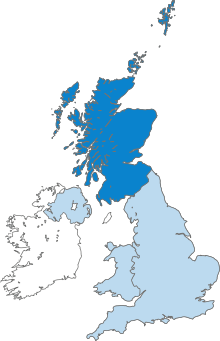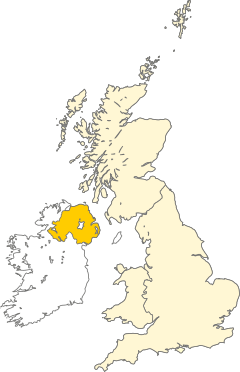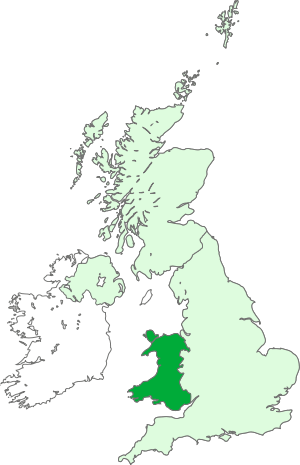Reserved and excepted matters
In the United Kingdom reserved matters and excepted matters are the areas of government policy where the UK Parliament had kept the power (jurisdiction) to make laws (legislate) in Scotland, Wales and Northern Ireland.
Each of these nations has been granted autonomy within the UK; therefore some power has been decentralised to them from the central government at Westminster and some has been withheld.
They are also known as reserved matters and act as a guide for which areas are devolved to those three nations and which are not. The powers are set out in three main laws for each of those nations and subsequent amendments which further devolved powers to the respective legislatures:
- Scotland Act 1998 amended by the Scotland Act 2012 and the Scotland Act 2016.
- Northern Ireland Act 1998 amended by the Northern Ireland Act 2006.
- Government of Wales Act 1998 amended by the Government of Wales Act 2006 and the Wales Act 2017
In Scotland, a list of matters is explicitly reserved in the Scotland Act. Any matter not explicitly listed in the Act is implicitly decentralised to the Scottish Parliament.
In Northern Ireland, the powers of the Northern Ireland Assembly do not cover reserved matters or excepted matters. In theory, reserved matters could be devolved at a later date, but excepted matters were not supposed to be considered for further devolution. In practice, the difference is minor as Parliament is responsible for all the powers on both lists and must give its consent to devolve them.
In Wales, by contrast, a list of matters is explicitly devolved to the National Assembly for Wales and any matter not listed in the Act is implicitly reserved to Westminster. Wales has since moved to a reserved powers model under the provisions contained within the Wales Act 2017.
Scotland

The Scottish Parliament was created by the Scotland Act 1998, passed by the Parliament of the United Kingdom. This Act sets out the matters still dealt with by the Westminster parliament, referred to as reserved matters.
The legal ability of the Scottish Parliament to legislate (its "legislative competence") on a matter is largely determined by whether it is reserved or not.[1][2][3][4]
Anything not listed as a specific reserved matter in the Scotland Act is automatically devolved to Scotland, including:
- agriculture, fisheries, forestry and rural development
- ancient monuments and historic buildings
- culture
- economic development
- education and training
- environment
- fire and rescue services and promotion of fire safety
- food
- health and health services
- transport
- housing
- local government
- the Scottish Parliament
- public administration
- social welfare
- sport and recreation
- tourism
- town and country planning
- water and flood defence
This is one of the key differences between the Scotland Act 1998 and the never-implemented Scotland Act 1978.
List of reserved matters
Reserved matters are subdivided into two categories: General reservations and specific reservations.
General reservations cover major issues which are always handled centrally by the Parliament in Westminster:[5]
- the Crown
- the Union with England and Wales
- the making of peace or war
- defence
- treaties or any relations with foreign states or dominions
- naturalization
- external trade
- quarantine
- navigation (including merchant shipping)
- submarine cables
- wireless telegraphy
- aerial navigation
- lighthouses
- currency
- copyright
- treason
- the UK Parliament
- registration and funding of political parties
- international development
- the Home Civil Service
Specific reservations cover particular areas of social and economic policy which are reserved to Westminster, listed under 11 'heads':[6]
- Head A - Financial and Economic Matters
- fiscal, economic and monetary policy
- currency
- financial services
- financial markets
- money laundering
- Head B - Home Affairs
- data protection and access to information
- elections
- film classification
- immigration and nationality
- scientific procedures on live animals
- national security and counter-terrorism
- betting, gaming and lotteries
- emergency powers
- extradition
- lieutenancies
- Charities
Head C – Trade and Industry
- business associations
- insolvency
- competition
- intellectual property
- import and export control
- sea fishing outside the Scottish zone
- customer protection
- product standards, safety and liability
- weights and measures
- telecommunications
- postal services
- research councils
- Head D – Energy
- Head E - Transport
- Head F – Social Security
- social security schemes
- child support
- pensions
- Head G – Regulation of the Professions
- Head H – Employment
- Head J – Health and Medicines
- xenotransplantation
- embryology, surrogacy and human genetics
- medicines, medical supplies and poisons
- welfare foods
- Head K – Media and Culture
- Head L – Justice
- Legal services
- Legal aid
- Coroners
- Arbitration
- information rights
- mental capacity
- personal data
- public records
- public sector information
- Compensation for persons affected by crime and miscarriages of justice
- Prisons and offender management
- Family relationships and children
- Gender recognition
- Registration of births, deaths and places of worship
- Head M – Land and Agricultural Assets
- Registration of land
- Registration of agricultural charges and debentures
- Development and buildings
- Head N – Miscellaneous
- judicial salaries
- equal opportunities
- control of weapons of mass destruction
- Ordnance Survey
- Deep Sea mining
- time
- outer space
- Antarctica
The reserved matters continue to be controversial in some quarters and there are certain conflicts or anomalies. For example, while the funding of Scottish Gaelic television is controlled by the Scottish Government, broadcasting is a reserved matter, and while energy is a reserved matter, planning permission for power stations is devolved.
Northern Ireland

Government of Ireland Act 1920
Devolution in Northern Ireland was originally provided for in the Government of Ireland Act 1920, which stated that the Parliament of Northern Ireland could not make laws in the following main areas:[7]
- the Crown
- the Union with England, Scotland and Wales
- the making of peace or war
- the armed forces
- treaties or any relations with foreign states or dominions
- naturalization
- external trade
- quarantine
- navigation (including merchant shipping)
- submarine cables
- wireless telegraphy
- aerial navigation
- lighthouses
- currency
- copyright
This was the first practical example of devolution in the United Kingdom and followed three unsuccessful attempts to provide home rule for the whole island of Ireland:
Irish unionists initially opposed home rule, but later accepted it for Northern Ireland, where they formed a majority. (The rest of the island became independent as what is now the Republic of Ireland.)
Direct rule
The Parliament of Northern Ireland was suspended on 30 March 1972 by the Northern Ireland (Temporary Provisions) Act 1972,[8] with Stormont's legislative powers being transferred to the Queen in Council.
Northern Ireland Constitution Act 1973
The Parliament of Northern Ireland was abolished outright by the Northern Ireland Constitution Act 1973;[9] legislative competence was conferred instead on the Northern Ireland Assembly. The 1973 Act set out a list of excepted matters (sch. 2) and "minimum" reserved matters (sch. 3).
The new constitutional arrangements quickly failed, and the Assembly was suspended on 30 May 1974 having only passed two Measures.
Direct rule again
The Assembly was abolished under the Northern Ireland Act 1974,[10] which transferred its law-making power to the Queen in Council once again. The 1974 framework of powers continued in place until legislative powers were transferred to the present Northern Ireland Assembly under the Northern Ireland Act 1998, following the Belfast Agreement of 10 April 1998.
Northern Ireland Act 1998
List of key excepted matters
Excepted matters are outlined in Schedule 2 of the Northern Ireland Act 1998:[11]
List of key reserved matters
Reserved matters are outlined in Schedule 3 of the Northern Ireland Act 1998:[12]
- navigation (including merchant shipping)
- civil aviation
- The foreshore, sea bed and subsoil and their natural resources
- postal services
- import and export controls, external trade
- national minimum wage
- financial services
- financial markets
- intellectual property
- units of measurement
- telecommunications, broadcasting, internet services
- The National Lottery
- xenotransplantation
- surrogacy
- human fertilisation and embryology
- human genetics
- consumer safety in relation to goods
Devolution of policing and justice
After the suspension of the Parliament of Northern Ireland, policing and justice powers transferred to the UK Parliament and were subsequently administered by the Northern Ireland Office within the UK Government. These powers were not devolved after the Belfast Agreement.
The Hillsborough Castle Agreement [13] on 5 February 2010 resulted in the following reserved powers being transferred to the Northern Ireland Assembly on 12 April 2010:[14]
- criminal law
- policing
- prosecution
- public order
- courts
- prisons and probation
Some policing and justice powers remain reserved to Westminster:[15]
- the prerogative of mercy in terrorism cases
- drug classification
- the Serious Organised Crime Agency
- accommodation of prisoners in separated conditions
- parades
- security of explosives
A number of policing and justice powers remain excepted matters and were not devolved. These include:
- extradition (as an international relations matter)
- military justice (as a defence matter)
- immigration
- national security (including intelligence services)
Parity
Northern Ireland has parity with Great Britain in three areas:
Policy in these areas is technically devolved but, in practice, follows policy set by the Westminster Parliament to provide consistency across the United Kingdom.[16]
Wales

Government of Wales Act 1998
The Government of Wales Act 1998 lists the following fields to be transferred to the National Assembly for Wales:[17]
- agriculture, forestry, fisheries and food
- ancient monuments and historic buildings
- culture (including museums, galleries and libraries)
- economic development
- education and training
- the environment
- health and health services
- highways
- housing
- industry
- local government
- social services
- sport and recreation
- tourism
- town and country planning
- transport
- water and flood defence
- the Welsh language
Government of Wales Act 2006
The Government of Wales Act 2006 updated the list of fields, as follows:[18]
- agriculture, fisheries, forestry and rural development
- ancient monuments and historic buildings
- culture
- economic development
- education and training
- environment
- fire and rescue services and promotion of fire safety
- food
- health and health services
- highways and transport
- housing
- local government
- the National Assembly for Wales
- public administration
- social welfare
- sport and recreation
- tourism
- town and country planning
- water and flood defence
- the Welsh language
Schedule 5 to the 2006 Act may be amended to add specific matters to the broad subject fields, thereby extending the legislative competence of the Assembly.[19]
Wales Act 2017
Under the terms of the Wales Act 2017, matters not reserved are within the legislative competence of the National Assembly of Wales. These reserved matters are:
- the Crown
- the making of peace or war
- defence
- treaties or any relations with foreign states or dominions
- naturalization
- external trade
- quarantine
- navigation (including merchant shipping)
- submarine cables
- wireless telegraphy
- aerial navigation
- lighthouses
- currency
- copyright
- treason
- the UK Parliament
- registration and funding of political parties
- international development
- the Home Civil Service
Specific reservations cover particular areas of social and economic policy which are reserved to Westminster, listed under 13 'heads':
- Head A - Financial and Economic Matters
- fiscal, economic and monetary policy
- currency
- financial services
- financial markets
- money laundering
- Head B - Home Affairs
- drug abuse
- data protection and access to information
- elections
- firearms
- film classification
- immigration and nationality
- scientific procedures on live animals
- national security and counter-terrorism
- betting, gaming and lotteries
- emergency powers
- extradition
- lieutenancies
- Charities
Head C – Trade and Industry
- business associations
- insolvency
- competition
- intellectual property
- import and export control
- sea fishing outside the Scottish zone
- customer protection
- product standards, safety and liability
- weights and measures
- telecommunications
- postal services
- research councils
- Head D – Energy
- Head E - Transport
- Head F – Social Security
- social security schemes
- child support
- pensions
- Head G – Regulation of the Professions
- Head H – Employment
- Head J – Health and Medicines
- xenotransplantation
- embryology, surrogacy and human genetics
- medicines, medical supplies and poisons
- welfare foods
- Head K – Media and Culture
- Head L – Justice
- Legal services
- Legal aid
- Coroners
- Arbitration
- information rights
- mental capacity
- personal data
- public records
- public sector information
- Compensation for persons affected by crime and miscarriages of justice
- Prisons and offender management
- Family relationships and children
- Gender recognition
- Registration of births, deaths and places of worship
- Head M – Land and Agricultural Assets
- Registration of land
- Registration of agricultural charges and debentures
- Development and buildings
- Head N – Miscellaneous
- judicial salaries
- equal opportunities
- Antarctica
- control of weapons of mass destruction
- Ordnance Survey
- Deep Sea mining
- time
- outer space
Previously transferred matters
Prior to the passage of the Wales Act 2017, issues were only devolved if outlined in the Government of Wales Act 1998 or the Government of Wales Act 2006.
Transferred matters for Wales are outlined in the Government of Wales Act 1998 and the Government of Wales Act 2006.
References
- ↑ Scotland Act 1998, s. 29
- ↑ Scotland Act 1998, s. 30
- ↑ Scotland Act 1998, sch. 4
- ↑ Scotland Act 1998, sch. 5
- ↑ Scotland Act 1998, Schedule 5, Part I
- ↑ Scotland Act 1998, Schedule 5, Part II
- ↑ Government of Ireland Act 1920, s. 3
- ↑ Northern Ireland (Temporary Provisions) Act 1972
- ↑ Northern Ireland Constitution Act 1973
- ↑ Northern Ireland Act 1974
- ↑ Northern Ireland Act 1998, Schedule 2
- ↑ Northern Ireland Act 1998, Schedule 3
- ↑ Hillsborough Castle Agreement 2010
- ↑ Northern Ireland Act 1998 (Amendment of Schedule 3) Order 2010
- ↑ Policing and Justice motion, Northern ireland Assembly, 12 April 2010 Archived 16 December 2010 at the Wayback Machine.
- ↑ Northern Ireland Act 1998, Part VIII, Social security, child support and pensions
- ↑ Government of Wales Act 1998, Schedule 2
- ↑ Government of Wales Act 2006, Schedule 5
- ↑ Government of Wales Act 2006, Schedule 5 (as amended) Archived 20 November 2010 at the Wayback Machine.
External links
Legislation
- Text of the Scotland Act 1998 as in force today (including any amendments) within the United Kingdom, from legislation.gov.uk
- Text of the Northern Ireland Act 1998 as in force today (including any amendments) within the United Kingdom, from legislation.gov.uk
- Text of the Government of Wales Act as in force today (including any amendments) within the United Kingdom, from legislation.gov.uk
- Text of the Government of Wales Act 2006 as in force today (including any amendments) within the United Kingdom, from legislation.gov.uk
.svg.png)